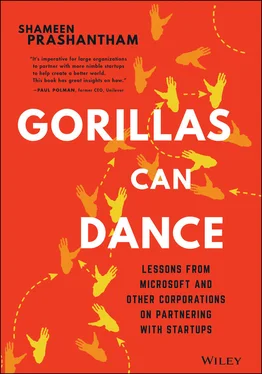The BizSpark One program was in effect seeking to foster the development of startups that could be put forward as examples for the thousands of other startups vying to partner with Microsoft, as well as turn into potentially significant partners in the future. Since all of the selected startups came from the BizSpark partner program pool, they were all young (less than three years old) and had built their software offerings on Microsoft platform technologies. As Matt Clark observed: “Startups are the next generation of partners for Microsoft. Our whole business will rely on how well they succeed. BizSpark One extends the BizSpark program. We try to find the highest potential startups and provide technical and business support that helps them grow and succeed.” 21
In 2010, when I attended the One Summit, a soft launch for the program in Mountain View, California, it was apparent that, for many of the startups selected to be on the program, there was a strong sense of being fortunate to have the opportunity. The majority of these came from North America and Western Europe. (One Chinese startup, Gridsum, did benefit greatly from BizSpark One, as discussed in the next section on emerging markets.)
In 2011, at Microsoft's annual Worldwide Partner Conference (WPC) in Los Angeles, which took place about eight months after the One Summit, some of the BizSpark One success stories were showcased at this event, which brought together approximately 15,000 delegates from the company's formidable partner ecosystem. As the then-president of the server and tools business, Satya Nadella gave a stirring speech about the importance of cloud computing. 22 Indeed, a few BizSpark One startups were finding that betting on the cloud was paying off for them. For example, at the 2011 WPC, StorSimple, a Silicon Valley startup offering cloud-integrated storage solutions, 23 was named BizSpark Startup of the Year. It was later acquired by Microsoft. 24
The 2011 WPC was also significant for another BizSpark One startup, called Calinda. This French startup's efforts to enter the US market received a big boost when it was showcased along with a few other BizSpark One startups in a booth at the WPC that would have otherwise been well beyond their means. Through the networking that occurred at that event, it signed up its first resellers in the US market, who were themselves members of Microsoft's partner network. A magical moment at the 2011 WPC happened one evening when I was sipping drinks outside the venue with these entrepreneurs: Microsoft's BizSpark One team had arranged for these startups' logos to be flashed on a big neon screen outside the convention hall. The entrepreneurs excitedly grabbed their phones to take pictures and post on social media. The mood that night was electric.
However, there wasn't a happy ending for everyone. Later in 2011, a BizSpark One startup called Huddle began to publicly position itself as a rival to Microsoft. 25 This came as a bit of a surprise to Microsoft, since this British company had been previously showcased as a poster child of BizSpark One. It was not the only startup whose relationship with Microsoft soured or became indifferent. Some startups were simply not proactive enough to grab (or create) opportunities for creating value within Microsoft's ecosystem. Others built good relationships with the startup engagement team but found the going hard once they started interacting with the (less sympathetic) business units – which is where the real opportunities for joint value creation are.
Israel provided a noticeable difference in the composition of the BizSpark One portfolio of startups between the One Summit in October 2010 and the WPC in July 2011. A manager called Tzahi (Zack) Weisfeld at Microsoft Israel had been proactively looking for ways to promote startup partnering in his locale. He and his team found Lewin's efforts through BizSpark One to be highly relevant to Israeli startups. A set of Israeli startups became an important subset of the BizSpark One portfolio. Indeed, with corporate involvement and support from leaders like Lewin and Somasegar, Israel would play an influential role in Microsoft's startup partnering journey.
Adopting New Corporate Innovation Practices
In late 2011, Weisfeld met with Satya Nadella (head of Microsoft's server and tools division at the time) and highlighted the need for deep engagement with startups. Weisfeld cited Paul Graham's blog post “Microsoft is Dead” 26 and recommended additional formats, such as corporate accelerators, to work with startups. Weisfeld and his team at Microsoft's research facility in Israel had recognized the potential for working much more closely with promising startups through an accelerator model. Managers in Microsoft's research unit in China and India warmed to the idea. Executives like Somasegar were highly involved in and supportive of this initiative as it unfolded. 27
In 2012, Microsoft launched accelerators in Tel Aviv, Bangalore, and Beijing, housed within its research facility in each location. All of these milieus had promising startup ecosystems. The format of the accelerator program was that startups would be co-located for four months (initially six, in China) during which time they would have access to cloud computing and other technology infrastructure, mentoring, and opportunities to build networks with Microsoft managers and partners. The accelerator program would conclude with a demo day attended by Microsoft managers as well as select partners and investors. In 2013, using the same template, accelerators were launched in three important European startup ecosystems: Berlin, London, and Paris. And the following year, an accelerator was established in Seattle, Microsoft's own backyard. Global responsibility for running all the Microsoft accelerators was given to Weisfeld, who continued to be based in Israel.
Although the early accelerators explicitly focused on offering free credits of Azure, Microsoft's cloud computing service, a technology-agnostic attitude was adopted to the selection of startup partners. That is, it was not deemed problematic if startups preferred other cloud solutions such as Amazon's AWS. The first Microsoft accelerator I visited was the one in Beijing. I recall vividly my astonishment at seeing Apple equipment on the startup's tables in their co-working space. Mouth agape, I turned to my host, David Lin, the then-director of the Beijing accelerator. Lin smiled and said, “We want startups to know that we are interested in their success.” Although it was clear that Microsoft was incentivizing the use of its cloud tools, at that stage Microsoft did not make working on its own technology a precondition for joining its accelerators. This suggests that Microsoft was working hard to win the hearts and minds of startups.
During one research field trip to India, I observed a Wednesday afternoon session at Microsoft Accelerator, which had the strong support of CFO Amaresh Ramaswamy and the leadership of a former entrepreneur, Mukund Mohan. Initially, there were a couple of partners – one from Nokia and another from SAP – who gave brief talks about how they might be able to support the dozen or so startups represented in the room. Next, the startups engaged in some peer sharing with three startups, demonstrating some of the progress they had made – for example, one entrepreneur demoed his work-in-progress app – and received feedback from mentors and the other entrepreneurs. Finally, everyone trooped to a local pub for beer and pizza. Chatting with the entrepreneurs in that informal setting, I could sense a palpable buzz among them.
On a visit to the Tel Aviv accelerator, I noticed that an event for startup alumni was going on in the adjacent room. When I met managers and entrepreneurs at the London accelerator I was struck by the upbeat mood of the entrepreneurs who felt Microsoft's cloud offering was valuable to the startups there, a view echoed by a senior marketing director, Helen Litvak. On yet another field trip I met the heads of the Bangalore, Beijing and Tel Aviv accelerators who had come together to compare notes and share their learnings with each other.
Читать дальше












